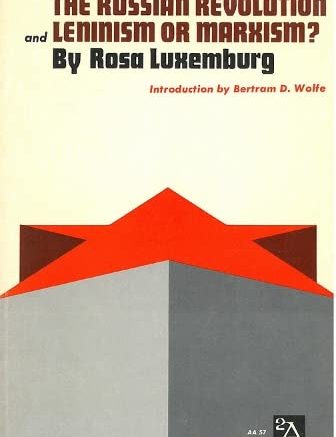This is effectively two long articles combined in one small book, and re-reading it after many years, I can now understand it in a different light than before.
Rosa Luxemburg has been claimed by many competing left groups ranging from moderate Social Democrats to Trotskyists and Stalinists. The essays here provide arguments for all sides. For example, the uncompleted book that constitutes ‘The Russian Revolution’ is full of praise for Lenin and the Bolsheviks. And its criticisms largely come from the left, not the right. Luxemburg opposed early Bolshevik decisions to give land to the peasants (she proposes a kind of collectivization instead). And she absolutely detests the Bolshevik decision to support the right of nations to self-determination. (On this later point she had a history: she was an opponent of Polish independence even as leader of one of Poland’s Social Democratic parties.)
But she also comes down hard on the Bolsheviks for their decision to disperse the elected Constituent Assembly in early 1918, and for their refusal to guarantee freedom of the press and the right to assembly. It’s a mixed bag, and it’s incomplete. There are many “notes to self” throughout.
The second article was written a decade and a half earlier and it is Luxemburg’s answer to Lenin’s proposals regarding the structure of the Russian Social Democratic Party. Lenin was advocating a kind of ‘ultra-centralisation’ which Luxemburg opposed. She was far more convinced that the masses on their own could create the revolution without the help of an all-powerful, all-knowing Central Committee. The last line of the book has become very well known: ‘Historically, the errors committed by a truly revolutionary movement are infinitely more fruitful than the infallibility of the cleverest Central Committee.’
A book as complicated as its author, with arguments to justify many interpretations — but recommended reading nonetheless.
